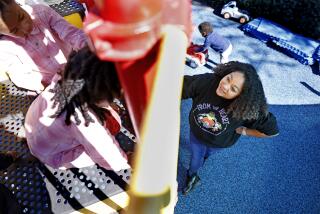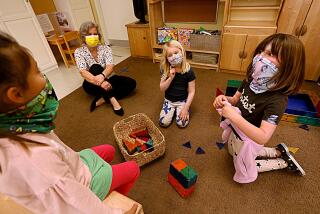Study Examines Effect of Welfare Programs on Teens
- Share via
New research examining the well-being of children under welfare reform suggests that teenagers perform worse in school when their mothers go to work, possibly because they are left with household chores and baby-sitting.
In contrast, grade-school children seem to benefit from mothers working as long as their families continue to receive some level of government financial aid.
The findings, to be released today by a national research group, are among the first cautious indicators that specific welfare policies can affect the emotional, social and educational progress of children.
And they come as Congress and the states begin to debate whether to renew or change the nation’s 1996 welfare reform law, which imposed stricter work rules and lifetime limits on benefits.
The report by the New York-based Manpower Demonstration Research Corp. appears to support the value of policies that supplement the wages of working families with ongoing financial aid and loosen time limits for parents who are trying to meet work requirements.
“The broadest implication is that welfare policies do matter for children,” said co-author Virginia Knox, a senior research associate at the Manpower organization.
The study found that young children benefit from welfare programs that supplement the incomes their families earn at work.
The gains those youngsters made in school were analogous to increasing their scores on achievement tests from the 25th to the 30th percentile and appeared to be long-lasting, according to the study. The children’s behavior and health also improved.
“It looks like families are spending the extra money on food, clothing and especially child care, and that may be one of the ways their income is benefiting children,” said lead author Pamela Morris.
However, the studies found that when mothers went to work, their older children were burdened with more household chores and child-care responsibilities that harmed their school work. Specifically, a higher proportion of teens whose parents participated in work programs (as opposed to those in control groups) were likely to repeat a grade or be enrolled in special education classes, although they were no likelier to have been suspended or to have dropped out of school.
In addition, the authors said, the supposed positive attributes of work don’t appear to improve parenting skills, reduce maternal depression or boost the mother’s or children’s self-esteem.
“Welfare reform programs may not undermine participation in school, but they do affect the academic progress of youth who are already at considerable risk of not completing school,” the report said.
The study suggests that expansion of mentoring and after-school programs for adolescents and greater reliance on child-care centers for their younger siblings could ease some of the strain.
The report looked at studies of 16 welfare and work programs, including ones in Los Angeles and Riverside counties, that surveyed 9,500 elementary school children and 6,000 teenagers over several years.
The well-being of children is emerging as a key issue as policymakers consider reauthorizing welfare laws that expire this year and as more single mothers are thrust into the work force during a weakened economy. The Bush administration is proposing that states implement stricter work requirements, which critics contend could harm children whose parents are forced into low-paying, dead-end jobs.
The U.S. Department of Health and Human Services, which oversees welfare programs, did not return a call seeking comment on the study.







